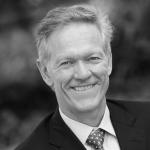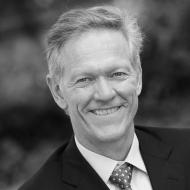How to Pursue Your Purpose
How do you find and pursue your calling? How do you transition careers? What do institutions need in their leaders?
Scott Beardsley became dean of the University of Virginia Darden School of Business after a 26-year tenure at McKinsey & Company. Author of the book Higher Calling: The Rise of Nontraditional Leaders in Academia, Dean Beardsley sat down with University of Virginia Press’ Editor-in-Chief Eric Brandt to discuss his own experience as a “nontraditional” leader, how he discovered his calling, and advice for institutions shifting in leadership and individuals shifting vocations.
Edited highlights of their conversation follow.
From McKinsey to Mission
Q: Scott, in my career in publishing, I’ve observed that some of the best books come from the heart. You have an interesting personal story that seems to have inspired this book. Could you tell us a little bit about how you made the transition from McKinsey & Company, a global consulting firm, to an academic environment like the University of Virginia Darden School of Business?
A: Well, it’s an overall process of life, if you will. I come from a family of educators, and I was the black sheep who went to work in the corporate world, but I always had nothing but the highest regard for those who were in higher education.
At McKinsey, I led learning and leadership development, kind of a global McKinsey University. I got a chance to work with amazing people and a faculty of about 200, all operating through a shared-governance model. It was much more consultative than a top-down decision-making process, so the skill set was highly relevant to a higher education environment.
At the end of the day, while I had a wonderful career at McKinsey — and I’m very grateful that I had the opportunity to serve in many roles there — I asked myself whether my role had the mission that I wanted the rest of my life to meet. So the real story of me making the move from McKinsey and professional services management consulting to higher education is one about mission. I love the mission of higher education. I believe in the power of education, and I believe that the world needs educated people to solve the world’s greatest problems. So, in the time I have left on this earth, I want to focus my energy there.
What Is the Nontraditional Leader?
Q: The subtitle of your book refers to the nontraditional leader and the rise of nontraditional leaders in academia. Can you define what the nontraditional leader is?
A: It’s an interesting question. A lot of people talk about the nontraditional leader as if there’s a commonly understood definition of the term, but the research reveals that there is no agreement on what it means, either in the literature, among search firm executives or in the Academy. As such, the term, much like an ambiguous word like diversity that means different things to different people, can be fraught with bias.
For the purposes of my research, I use the definition that if you were ever on the tenure track as a faculty member, then you are considered to be traditional, and otherwise, you’re considered nontraditional.
Q: And is there anything in the research that characterizes patterns in what a nontraditional leader looks like in higher education?
A: There are thousands of different profiles out there, but there are some characteristics that Higher Calling’s research did find. About 90 percent of nontraditional leaders have doctorates. They tend to be disproportionately men, even on a per capita basis. Many of them have been involved in higher education — for example, by serving on a board or adjunct teaching. Most have work experience outside the Academy.
Where Is the Nontraditional Leader?
Q: Does the research show anything that characterizes the institutions that are hiring nontraditional leaders?
A: I tried to answer that exact question through a quantitative survey of the types of schools that actually hire nontraditional leaders, the way I defined the term for the purposes of the research. We should note that the data I gathered came from liberal arts colleges, roughly 250 of them.
The most predictive variable was ranking; the higher the ranking, the less likely the school was to hire a nontraditional candidate. There were other interesting variables. When schools have a religious affiliation, they’re more likely to have nontraditional leaders, and there are more nontraditional leaders in the South than there are in other geographies, like the West. Smaller schools tend to have more than larger schools.
The research also reveals that nontraditional leaders are very commonplace and no longer a rarity. Every type of institution — from the most prestigious to the lesser ranked — had both traditional and nontraditional leaders. After all, by my definition, a third of the leaders in liberal arts colleges are nontraditional. By more conventional definitions that require a traditional leader to have come up through the tenure track ranks and the provost office, more than one half of presidents are nontraditional. I think the rising trend of nontraditional leaders will continue.
Essentials of Leadership
Q: The University of Virginia has started its own search for a new president, and I’ve heard many debates about whether they want a nontraditional or traditional leader and what that person might look like. What do you think UVA would benefit from in a leader?
A: There are a lot of smart people that care about UVA on the search committee. UVA is a great institution, and they will select the candidate they want to solve the problems they believe are most relevant. Perhaps a different way to say it is that the profile of the leader selected will provide signals as to what problems that university is prioritizing.
What I would encourage the search committee — any search committee — to consider is what type of specific leadership characteristics they are looking for and not so much whether they want a traditional or nontraditional leader, as nobody even agrees on what the terms mean. A better discussion is the context of the institution and its needs.
With that being said, I do believe that the future leader of University of Virginia will need to be somebody who cares deeply about the institution and is familiar with it. I believe they have to be comfortable with leading a very complex environment and thinking strategically; half of the university’s revenue and employment is in the health care system, for example. I believe they have to buy in to the values and the history of the institution and believe deeply in the mission. I believe they really need to be a talent magnet, to be able to raise billions of dollars, to innovate using technology, and to understand how to operate in a decentralized university environment. There are other abilities, and they are covered in the comprehensive job description.
The truth is that any given president needs to have a lot of characteristics, but it’s really the leader’s ability to build a team that is collectively able to address the sets of issues faced by that institution that matters. No one person has every skill, but the leader that knows what he or she doesn’t know — and knows also what he or she is good at and not good at — is much more likely to bring together a team that is able to address the situation. That’s the recipe for success.
Pursuit of a New Path
Q: Your career path has been intrepid. As you’ve done it successfully, is there any advice you would give other people who would like to change career paths?
A: I think it all starts with knowing yourself and your personal values.
I teach a course here at the University of Virginia called “Maximizing Leadership Potential in Sports and Business,” in which we examine what it is that leads to fulfillment and achieving your full potential. And a lot of that is about knowing your personal values and noble purpose in life, knowing why you are doing what you are doing; your raison d’être, a topic I spoke about at graduation. So, the first step is for people to self-examine what gives them the greatest meaning in life. The second step is to examine what their strengths are, what they’re really good at; a lot of people don’t actually know. And then, what is a realistic set of opportunities that they might consider?
When you are considering transitions, I think it’s also important to have mentors and to pursue more than one possibility in parallel. In a world of uncertainty, options go up in value, and the same goes for a career.
The Measure of Success
Q: And one final question: What’s the best part of your job?
A: The best part of being a dean is knowing that we’re actually making a difference in the lives of students and other people. I choose to keep track of success by the other people I make successful, rather than by money or grades. When I get to see students that I’ve taught or faculty I’ve put in place with the generosity of alumni or some new scholarship vehicle that allows education to be accessible to somebody who might not otherwise have had the chance, I feel like what I’m doing matters. That’s what it’s all about. We only have a certain number of seconds left on this earth, and I want to make sure that every one of mine counts to the maximum.
Darden Dean Scott C. Beardsley is author of the book Higher Calling: The Rise of Nontraditional Leaders in Academia (University of Virginia Press).















